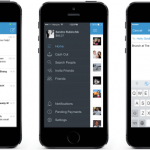Meet App Maker, A New Build-Your-Own-Apps Tool Based On The One Google Uses Itself
Google is working hard to convince big companies to adopt G Suite, the collection of web-based productivity software formerly known as Google Apps. And big companies typically need at least a few tools that are very specific to their business—the sort of stuff that Google is never going to create.
Which brings us to App Maker, the new offering that Google is rolling out as part of G Suite for Business, at first for customers who are part of its early-adopter program. It’s a browser-based platform for building browser-based corporate apps for internal use. And though it has an emphasis on approachable features such as drag-and-drop widgets you can use to rapidly assemble features without writing code, Google has also aimed to give it enough power to tackle fairly meaty development challenges as well as basic ones.
App Maker is based on functionality that Google has used to efficiently build more than 300 apps for its own use. “For the last year or so, we’ve been polishing it and making it customer-hardened and enterprise-ready,” says G Suite VP of engineering Elissa Murphy.
If all you want to do is slap together something simple such as an app to collect information from employees, you can create a spreadsheet-like database that gets stored in Google Drive, then pull together an interface with canned elements such as text fields, pop-up calendars, star ratings, and Google Maps views. For more advanced projects, serious coders can take advantage of SQL databases, scripting, and standards such as JQuery, and can hook App Maker creations into Google Analytics.
There are already plenty of services out there with a similar emphasis on speeding up software development and minimizing the need for code—notably Microsoft’s PowerApps, which was announced in 2015 and recently reached general availability. App Maker tries to distinguish itself by supporting existing technologies and extensibility rather than being purely self-contained. “This takes a bit more of an open approach to allowing developers to use the skills they know,” says Murphy.
One of the attractions of App Maker is that the apps you whip up run on the same infrastructure as the rest of G Suite, which means that a company doesn’t have to worry about them choking: “As your application scales to hundreds or thousands of users, that’s taken care for you,” says App Maker product manager Ajay Surie. For now, the tool is designed to build apps for use within a company, but Surie says that Google might evolve it into something that can host services on the open web if there’s a demand for that capability.
Beyond G Suite
Another thing about big companies: They like to feel confident that the services they use will work well together. With that in mind, Google is also announcing some new “recommended” third-party apps, a stamp of approval that means they integrate smoothly with the G Suite apps. The newcomers include Asana, Docusign, Freshdesk, LumApps, Virtru, Xero, and Zoho Invoice, which join existing recommended apps such as RingCentral and Smartsheet.
In picking these products, Murphy says, “We asked ourselves, what are the categories of products we’re not likely to fill, but we know customers are using?” For a company that’s already using Asana for project management or Xero for accounting, the fact that these services have partnered up with Google might be one more reason to give G Suite a try.
Fast Company , Read Full Story
(52)














